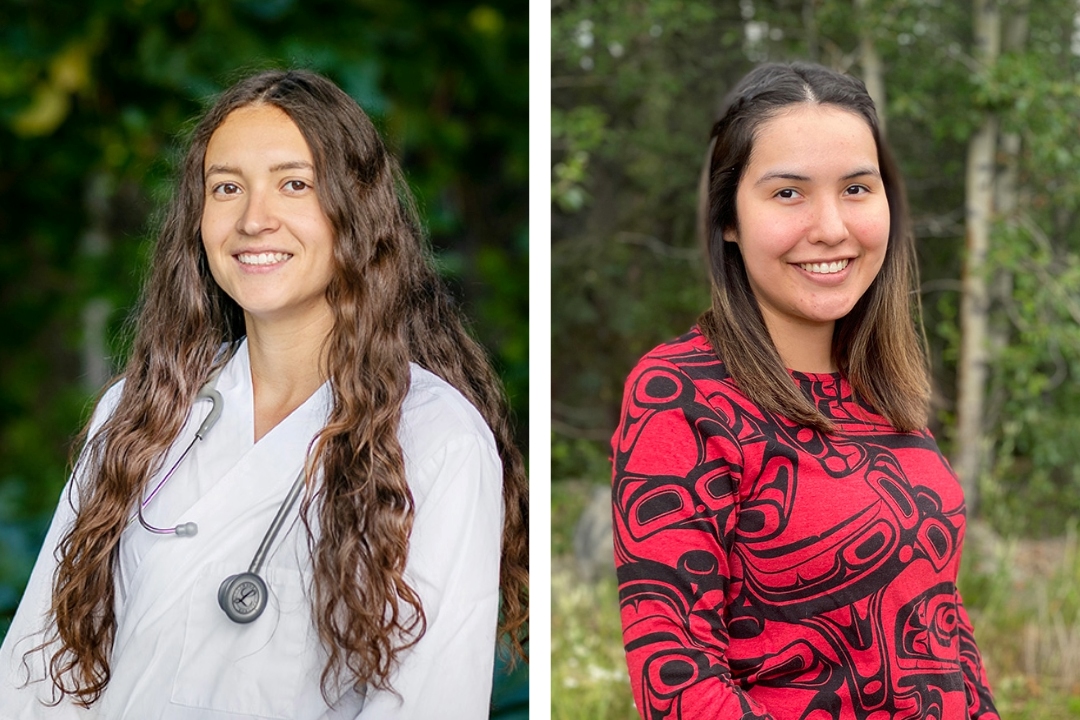
Award-winning students represent future of animal care in North
Two Western College of Veterinary Medicine (WCVM) veterinary students from Canada’s North have received scholarships from Veterinarians Without Borders-Vétérinaires Sans Frontières Canada (VWB/VSF).
By Tyler SchroederKandis Villebrun, a first-year student from Yellowknife, N.W.T., and Tannicka Reeves, a third-year student from Whitehorse, Yukon, received the VWB/VSF’s “Access to Care” awards for 2023.
Valued at $10,000 each, the northern student scholarships aim to decrease barriers for access to veterinary care in the northern regions of Canada where animal health resources are severely limited. Established in 2022, the VWB/VSF “Access to Care” program is open to applicants living in the northern territories, with priority given to Indigenous applicants.
In addition to the scholarship for veterinary students, the VWB/VSF also offers five $5,000 bursaries for individuals pursuing animal and One Health-related diplomas or certificates.
Both Villebrun and Reeves plan on returning to Northern Canada to practise veterinary medicine after completing the four-year Doctor of Veterinary Medicine (DVM) program at the WCVM.
Villebrun credits her northern upbringing in building an appreciation for animals.
“Animals have always been a main part of my life. I was immersed in an environment where we hunted and fished, and we always had pets too,” she says.
As Villebrun explained in an earlier article, her interest in biology and the concept of One Health became driving forces for her career ambitions in veterinary medicine. Villebrun says that limited accessibility to animal health care in her home territory is something she hopes to address in her future career.
“There’s only a couple of veterinary facilities in Yellowknife, and there aren’t any in surrounding communities. It’s not uncommon for many animals to go months without regular care.”
Villebrun feels grateful for being selected for the award in the early stages of her veterinary training.
“It was pretty amazing. I’ve put a lot of hard work into getting where I am, and now having this support in my first year is really going to help me make connections back home.”
Originally from the Taku River Tlingit First Nation in Atlin, B.C., Reeves’ upbringing as an Indigenous person has shaped her relationship with the world around her.
“I was raised with values that taught me to respect the environment, animals and other people, which I think has a lot to do with me pursuing veterinary medicine,” says Reeves. The idea of One Health was practised by Indigenous people long before the term was coined.”
Reeves now lives in Whitehorse with her family. She found inspiration to pursue a veterinary career from her time spent with her first dog, Koeda.
“My early role in caring for Koeda helped strengthen our human-animal bond. Taking him on many trips to the veterinary clinic led me to discover my path to becoming a veterinarian and helping pet owners give their pets the best possible care,” she says.
Learning about different animal species in Grade 11 biology class also played a role in Reeves’ choice of veterinary medicine: “I knew it would be a career with a lot of diversity and opportunities to keep learning.”
“A lot of [communities in] the North don’t have access to a veterinary career or are isolated because they are fly-in communities. These people care about animals as much as anybody, but they just don’t have the same resources.”
As an Indigenous woman, Reeves wants to inspire and help other Indigenous individuals pursue their dreams and overcome adversity along the way.
“I really want Indigenous youth to know that they can accomplish anything. Self-doubt is normal for anyone to have and that’s something that I have struggled with in the past. But you can achieve your dreams with hard work and believing in yourself.”
To learn more about VWB/VSF and their mission, visit vwb.org.
